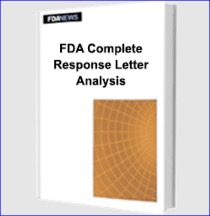FDA Issues Full Response Letter to Cefepime-taniborbactam Agreement

The FDA has issued a Complete Response Letter for the New Drug Application of cefepime-taniborbactam, requesting additional chemistry, manufacturing, and controls data.
A complete response letter (CRL) is a notice issued by the Food and Drug Administration (FDA) indicating that an application will not be approved in its present form. This can be issued in response to a New Drug Application (NDA), Abbreviated New Drug Application (ANDA), or Biologics License Application (BLA).
Venatorx Pharmaceuticals and Melinta Therapeutics announced this morning that the FDA issued a Complete Response Letter (CRL) regarding the New Drug Application (NDA) for cefepime-taniborbactam, a beta-lactam/beta-lactamase inhibitor combination antibiotic under review as a potential treatment for adult patients with complicated urinary tract infections (cUTI), including acute pyelonephritis caused by susceptible gram-negative microorganisms.
According to the companies, the CRL did not identify clinical safety or efficacy issues, and the FDA did not request any new trials to support the approval of cefepime-taniborbactam. The FDA did request additional chemistry, manufacturing, and controls (CMC) information and related data about the antibiotic, testing methods, and manufacturing process.
"While we are disappointed with this setback, we maintain utmost confidence in cefepime-taniborbactam,” Venatorx CEO Christopher J. Burns, PhD, said in a statement. “We are already hard at work generating the additional requested CMC data, and we will continue to work closely with the FDA so that we can make this important new medicine available to patients as quickly as possible."
What the Data Demonstrated
Although this is a setback for the companies, the release of data this past week demonstrated efficacy vs another antibiotic. The data was published in the New England Journal of Medicine.
Specifically, the data was from the CERTAIN study, which was a global, randomized, double-blind, active-controlled non-inferiority phase 3 trial evaluating the efficacy, safety, and tolerability of cefepime-taniborbactam compared to meropenem in adults with cUTI, including acute pyelonephritis.
The study enrolled 661 adult patients who were randomized 2:1 to receive cefepime-taniborbactam 2.5g q8h or meropenem 1g q8h for 7 days (up to 14 days for patients with bacteremia).
The primary efficacy endpoint evaluated the composite clinical and microbiologic response (i.e., bacterial eradication) at the Test of Cure (TOC) visit (Day 19-23) in the microbiological intent-to-treat (microITT) population as specified by FDA and European Medicines Agency guidance.
Cefepime-taniborbactam met the primary efficacy endpoint of statistical noninferiority (NI) to meropenem in the microITT population at TOC with composite microbiologic and clinical success occurring in 70.0% of cefepime-taniborbactam treated patients and 58.0% of meropenem treated patients (treatment difference 11.9; 95% confidence interval (CI), 2.4, 21.6).
A prespecified superiority test following confirmation of NI demonstrated the statistical superiority of cefepime-taniborbactam for the composite endpoint at TOC. The superiority of cefepime-taniborbactam was sustained for the composite microbiologic and clinical response at the Late-Follow-Up (Day 28-35) visit.
Rates of treatment-emergent adverse events (TEAEs) were 35.5% for cefepime-taniborbactam and 29.0% for meropenem. Serious TEAEs occurred in 2.0% and 1.8% of cefepime-taniborbactam and meropenem treated patients, respectively.
Treatment discontinuations due to TEAEs were infrequent, occurring in 3.0% of cefepime-taniborbactam patients and 0.9% of meropenem treated patients.
Commercialization, Other Potential Indications
In a previous interview with Contagion, Venatorx’s Burns discussed commercialization plans. In recent months, Venatorx announced partnerships with Melinta Therapeutics in the United States and the Menarini Group internationally.
Venatorx is also studying cefepime-taniborbactam for hospital-acquired bacterial pneumonia and ventilator-associated bacterial pneumonia (HABP/VABP) in adults. “We are planning to imminently begin enrollment of what's often euphemized, as a half-of-that study, of a hospital acquired bacterial pneumonia study,” Burns said in the previous interview.
February 23, 2024



